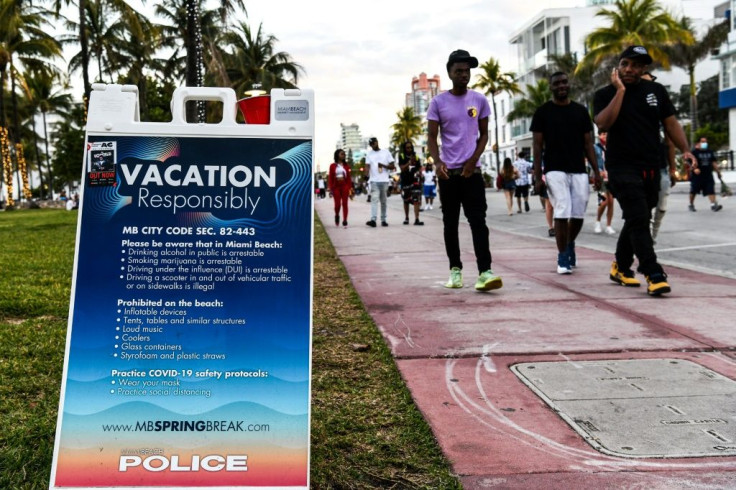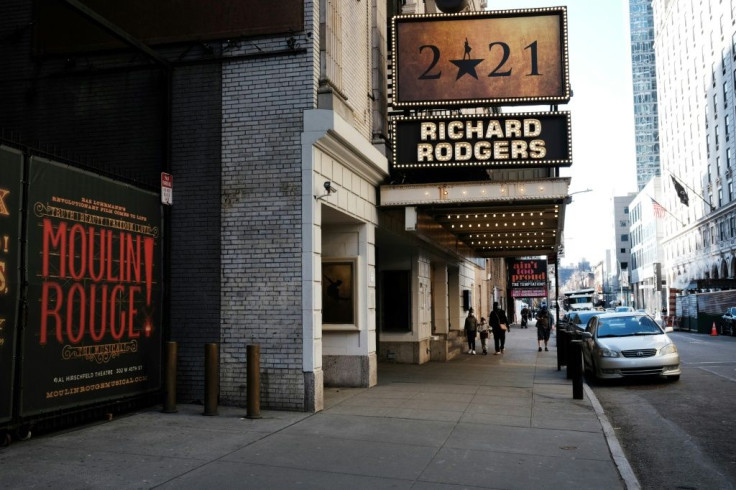Vaccines, Spring Weather Lift Hopes For US Travel Comeback
After a year of pandemic restrictions, Americans want to get back on the move -- a dynamic apparent in Miami's spring break revellers and Washington's deluge of rental cars each weekend.
Travel volumes remain depressed, but off their lows. Since March 11, between 1 and 1.5 million people per day have traveled by air, according to Transportation Security Administration data.
That level, while less than half the volume in 2019, stands well above the worst of the pandemic. Many in the travel industry are optimistic about a lift from vaccines after a catastrophic 2020 amid the Covid-19 pandemic.
"Spring is bringing warmer weather and a brighter outlook for the travel industry," said Amir Eylon, president of market consultancy Longwoods International.
"The faster the progress is on vaccines and controlling the virus, the faster the battered travel sector will recover."

The United States is administering about 2.5 million doses of vaccine per day. A majority of the population is on track to be vaccinated by the July 4 national holiday, setting the stage for a much busier travel outlook.
A new poll shows that 87 percent of American travelers have travel plans in the next six months, the highest level since March 2020 at the start of the pandemic, according to a Longwoods survey published this week.
"Only a third of travelers now say that Covid-19 will greatly impact their decision to travel in the next six months, the lowest level in a year," according to the survey.
United Airlines on Thursday announced it was adding 26 new routes between Midwestern cities and coastal destinations such as Hilton Head, South Carolina and Portland, Maine.

Among the destinations eager for a comeback is New York City, which saw 66.6 million visitors in 2019.
For now, most people visiting to the Big Apple are "within driving distance" of the city, said Chris Heywood, spokesman for NYC & Company, the city's official tourism and travel promotion organization.
"We are starting to see a lot of greenshoots of recovery," Heywood said, adding that domestic and leisure travel is coming back faster than international and business travel.
Data shows New York's hotels are becoming busier. The hotel occupancy rate was 47 percent for the week of March 7, the highest level since June 2020, according to data from STR.
That is still well below the 87 percent in the same period of 2019, but there are clear signs of life on weekends: On Saturday, March 13, occupancy reached 61.5 percent.
NYC & Company projects 36.4 million visitors in 2021 after the city had 22 million in 2020.
"Travel and tourism is the industry hardest hit by the economic fallout of Covid, and the damage is so severe that a broader economic recovery will stall if we can't get travel off the ground," said Roger Dow, chief executive of US Travel, a nonprofit representing the travel industry.
Dow expressed optimism about a rebound in domestic travel, "but that alone won't get the job done," he said. "A full travel recovery will depend on reopening international markets, and we must also contend with the challenge of reviving business travel."
Spending on travel fell 42 percent in 2020 to $680 billion in the United States, according to data from US Travel.
Even as industry officials grow more hopeful, public health leaders warn against a premature resumption of activity. On Wednesday alone, some 85,000 new Covid-19 infections were reported, according to Johns Hopkins University.
"Now is not the time to travel," Rochelle Walensky, head of the Centers for Disease Control and Prevention, said on Monday.
Worries about renewed Covid-19 outbreaks prompted Miami officials to enact a nighttime curfew following an infusion of rowdy "spring breakers" that have frustrated locals.
© Copyright AFP {{Year}}. All rights reserved.





















